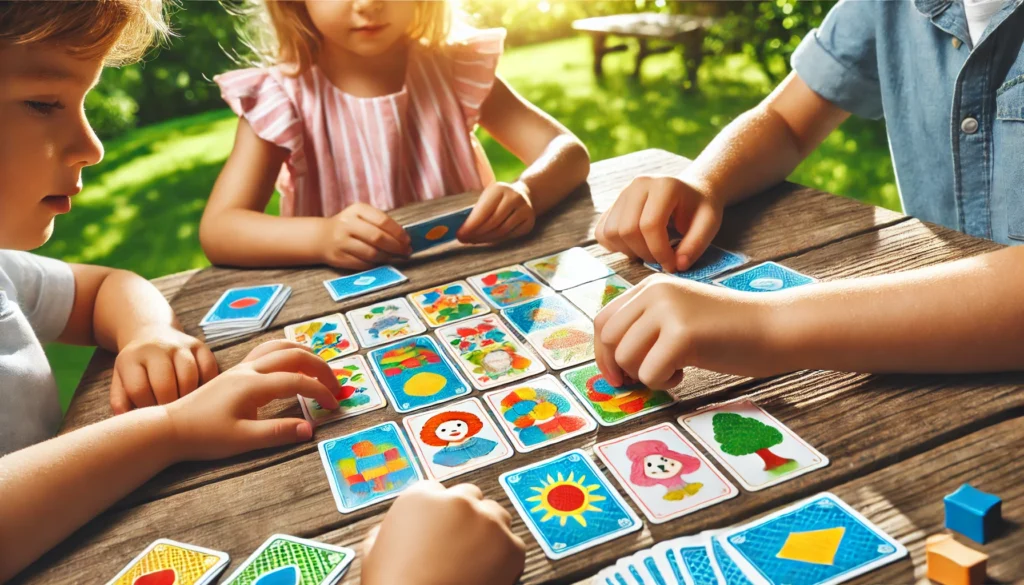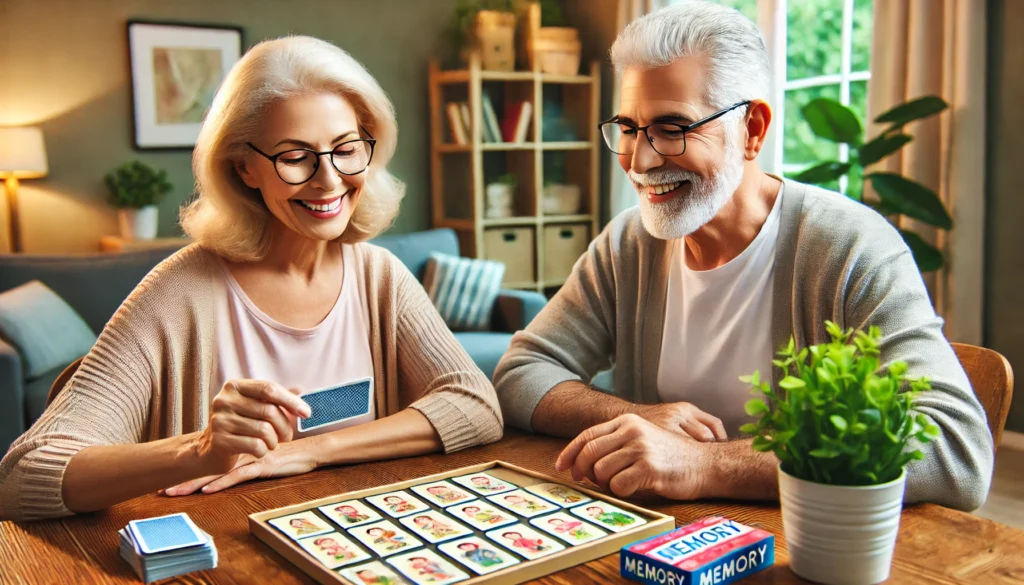Unlock Your Brain’s Potential: Why Memory Games Matter
Short-term memory serves as the cornerstone of our cognitive abilities, enabling us to juggle tasks, solve problems, and retain critical information in the moment. In today’s fast-paced world, where distractions abound, enhancing this crucial skill is more important than ever. But improving memory doesn’t have to be a chore. Enter memory card games—an entertaining and scientifically-backed way to sharpen your mental edge.
Memory card games offer a unique combination of fun and functionality. Beyond mere entertainment, they serve as a powerful tool to strengthen neural pathways, improve focus, and promote mental clarity. This article will not only delve into the myriad benefits of playing memory card games but also provide actionable tips on how to play memory games effectively. Whether you’re a student striving for academic excellence, a professional aiming to boost productivity, or simply someone interested in preserving brain health, these games can be your ally. Let’s explore why memory games are the perfect blend of recreation and cognitive enhancement.
You may also like: How to Improve Working Memory: Top Short-Term Boosters and Practical Tips
Understanding Short-Term Memory
Short-term memory, also known as working memory, refers to the brain’s ability to temporarily hold and process information. This type of memory is crucial for tasks requiring immediate recall, such as solving math problems or understanding conversation. Unlike long-term memory, which stores information over extended periods, short-term memory has a limited capacity and duration.
Studies in neuroscience reveal that short-term memory relies heavily on the prefrontal cortex and hippocampus. These brain regions work together to store and manage information. Memory games leverage this neural circuitry, creating opportunities to strengthen cognitive pathways through repeated engagement.
The Science Behind Memory Card Games
Memory card games stimulate key cognitive functions, including attention, recall, and pattern recognition. When you play memory card games, you challenge your brain to remember the positions of cards, fostering neural plasticity—the brain’s ability to adapt and reorganize itself.
Research highlights several benefits of engaging in such activities:
- Enhanced Neural Connections: Playing these games repeatedly strengthens synaptic connections in the brain, improving overall cognitive function.
- Improved Focus: The need to concentrate on card positions enhances attention span and mental clarity.
- Reduced Cognitive Decline: Studies show that regular cognitive engagement can slow age-related memory loss and reduce the risk of conditions like Alzheimer’s disease.
How to Play Memory Card Games
Learning how to play memory games is straightforward and accessible to all age groups. Memory card games typically involve a set of cards placed face down. The objective is to find matching pairs by flipping two cards at a time and remembering their positions.
Here is a step-by-step guide:
- Preparation: Arrange a shuffled set of cards face down on a flat surface. Cards with matching symbols, colors, or images work best.
- Gameplay: Players take turns flipping two cards at a time, trying to find pairs. If the cards match, the player keeps the pair and earns a point.
- Memory Recall: If the cards do not match, they are flipped back face down, and the next player takes their turn.
- Winning: The game ends when all pairs are found. The player with the most pairs wins.
By following these simple steps, you can enjoy the game while reaping its cognitive benefits. Additionally, incorporating variations, such as increasing the number of cards or introducing time limits, can make the game more challenging and engaging.
Benefits of Playing Memory Card Games
1. Cognitive Enhancement
Memory card games are excellent tools for improving cognitive functions. They require players to use short-term memory to recall card positions and matching pairs. Over time, this repeated mental exercise sharpens recall and attention.
2. Stress Reduction
Engaging in enjoyable activities like memory games can reduce stress levels. These games encourage a relaxed and focused state, helping players unwind from daily pressures.
3. Social Interaction
Many memory card games are designed for multiple players, fostering social interaction and collaboration. Playing with friends or family strengthens bonds and enhances communication skills.
4. Lifelong Learning
Memory card games are not just for children; they offer lifelong cognitive benefits for adults and seniors. Regularly playing such games helps maintain mental sharpness and delays cognitive decline.
Tips for Maximizing Cognitive Benefits
To make the most of memory card games, consider the following tips:
1. Play Regularly
Consistency is key to reaping the benefits of memory games. Dedicate a few minutes each day or week to playing, as regular engagement strengthens memory and attention over time.
2. Increase Complexity
As you become more proficient, challenge yourself by increasing the number of cards or introducing new game variations. This keeps the activity stimulating and prevents mental stagnation.
3. Combine with Other Brain-Boosting Activities
Pair memory card games with other cognitive exercises, such as puzzles, reading, or problem-solving tasks. This holistic approach amplifies the benefits and promotes overall brain health.
4. Encourage Group Play
Invite friends or family members to join you. Playing in groups not only enhances the fun but also fosters healthy competition and social bonding.

Long-Term Implications for Brain Health
The benefits of memory card games extend beyond immediate cognitive improvements. Regularly engaging in these activities contributes to long-term brain health in the following ways:
1. Neuroplasticity
The brain’s ability to adapt and form new neural connections is crucial for learning and memory. Memory card games stimulate this process, enhancing brain flexibility and resilience.
2. Prevention of Cognitive Decline
Studies indicate that cognitive engagement through games can delay the onset of age-related memory loss and dementia. These games act as a preventive measure by keeping the brain active and engaged.
3. Improved Emotional Well-Being
Mental stimulation through memory card games can enhance mood and reduce symptoms of anxiety and depression. The satisfaction of completing a challenging game provides a sense of accomplishment and joy.
Integrating Memory Games into Daily Life
Incorporating memory card games into your routine is easy and rewarding. Here are some practical ways to do so:
1. Set Aside Time
Allocate a specific time each day or week for playing memory games. Treat this as a valuable investment in your cognitive health.
2. Use Digital Alternatives
If physical cards are unavailable, numerous digital memory card games are accessible online or through mobile apps. These versions often include additional features, such as difficulty levels and performance tracking.
3. Make It a Family Activity
Transform memory card games into a family tradition. Engaging in these activities together creates cherished memories and strengthens family ties.
4. Incorporate Learning
Combine memory games with educational content. For instance, use cards with vocabulary words, historical facts, or math problems to enhance learning while playing.

Take Charge of Your Memory: A Final Word
Memory card games are more than a pastime; they are a gateway to unlocking the full potential of your cognitive abilities. By embracing these games as part of your routine, you invest in mental agility, focus, and overall brain health. Their benefits stretch across age groups, making them an invaluable tool for students, professionals, and seniors alike.
Now that you know how to play memory games and the incredible advantages they offer, it’s time to take the first step. Whether you choose traditional card decks or digital formats, the key lies in consistent practice and a willingness to challenge your brain. With every game, you build a stronger, sharper mind ready to tackle life’s complexities with ease. Start today and experience the transformative power of playing memory card games.
Further Reading
SoM: Boost Your Brain: Working Memory Exercises for Adults
ND: 12 Fun Working Memory Games And Activities For Adults
LH: 25 Memory Exercises That Actually Help You Remember More
MND: 22 brain exercises to improve memory, cognition, and creativity
MMM: How to Improve Working Memory: 8 Exercises That Work
Important Note: The information contained in this article is for general informational purposes only, and should not be construed as health or medical advice, nor is it intended to diagnose, prevent, treat, or cure any disease or health condition. Before embarking on any diet, fitness regimen, or program of nutritional supplementation, it is advisable to consult your healthcare professional in order to determine its safety and probable efficacy in terms of your individual state of health.
Regarding Nutritional Supplements Or Other Non-Prescription Health Products: If any nutritional supplements or other non-prescription health products are mentioned in the foregoing article, any claims or statements made about them have not been evaluated by the U.S. Food and Drug Administration, and such nutritional supplements or other health products are not intended to diagnose, treat, cure, or prevent any disease.


